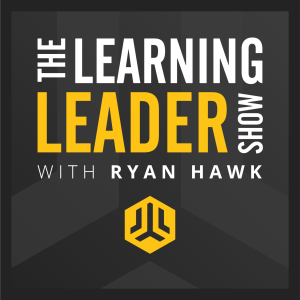
The Learning Leader Show With Ryan Hawk
Business:Management

553: Eric Potterat - Mental Disciplines for Leading and Winning from the World's Top Performers (Learned Excellence)
 2023-11-13
2023-11-13
Download
Right click and do "save link as"
Text Hawk to 66866 to become part of "Mindful Monday." Join 10's of thousands of your fellow learning leaders and receive a carefully curated email from me each Monday morning to help you start your week off right...
Full show notes at www.LearningLeader.com
Twitter/IG: @RyanHawk12 https://twitter.com/RyanHawk12
- “Amateurs focus on outcome. Professionals focus on process.” And if you want to change the process, focus on just one change at a time. He used the fly fishing analogy. You don’t change all three at once. Try one change and re-evaluate.
- I love the idea of creating a personal checklist for yourself much like pilots fill out every time before they fly a plane. We should all create our checklist and fill it out consistently. This is a great tool to become more self-aware.
- Top performers have a thirst for feedback in victory and defeat. The leaders who sustain excellence over time are intentional about surrounding themselves with a kitchen cabinet who is there to regularly provide feedback so that they can iterate and improve. That’s one of the biggest differences between those who sustain excellence over time and those who don’t.
- Goal Setting
- 34%-42% chance of hitting a goal if you ideate it
- 62% chance of hitting a goal if you write it down
- 75% chance of hitting a goal if you verbally share it with others
- Eric developed a psychological “resilience” test that when combined with data on the candidate's physical characteristics became a very good predictor of who would fail BUD/S (97%).
- While working with the Navy SEALs in San Diego, Eric frequently had guests come to observe the SEALs and how they worked. A lot of them were professional athletes like Tiger Woods, Lance Armstrong, Michael Phelps, and many more… While there, Eric asked to interview them. Over time he was able to build an extensive knowledge base of the mental approaches of the world’s top performers.
- “If your brain is firing, it’s wiring.” Learned from downhill skiers...
- Commonalities of leaders who sustain excellence:
- They accelerate what they value. They move from reputation to identity. They worry less about what others think.
- One of the biggest regrets of people on their deathbed is that they regret what they didn't do.
- Capitlize now to have no regrets later.
- Create a credo (your identity)
- Mindset
- They have a growth mindset (instead of a fixed mindset)
- They are thirsty for feedback (they want feedback in victory and defeat)
- Eric is agnostic about motivations - Clean fuel vs Dirty fuel
- They have different mindsets for the roles they play
- Think of yourself as a dimmer switch -- Sometimes you're white hot, sometimes you need to dim down
- Efficient and Consistent
- They manage their time well
- They sleep 8 hours
- They don't let life dictate what's important to them.
- Time = Currency. Block time for what's most important. Color code your calendar.
- Adversity Tolerance
- They control their human stress response
- They have a pre and post-performance routine
- They set goals
- They use visualization tools
- They compartmentalize well
- They use positive self-talk (they believe)
- They are good contingency planners
- They have high levels of self-awareness
- Like a pilot, they have checklists for themselves
- Balance and Recovery
- The more balanced, the more productive
- Feed all of your pillars
- Work
- Health
- Relationships
- Hobbies
- Spirituality
- Legacy
- They accelerate what they value. They move from reputation to identity. They worry less about what others think.
- Leadership role "Must-Haves"
- Emotional Intelligence - "Feel for a room"
- Empathy - Put our own perspective aside to understand others
- Curiosity - A desire to learn, to know more
More Episodes
012345678910111213141516171819
Create your
podcast in
minutes
- Full-featured podcast site
- Unlimited storage and bandwidth
- Comprehensive podcast stats
- Distribute to Apple Podcasts, Spotify, and more
- Make money with your podcast
It is Free
- Privacy Policy
- Cookie Policy
- Terms of Use
- Consent Preferences
- Copyright © 2015-2024 Podbean.com





